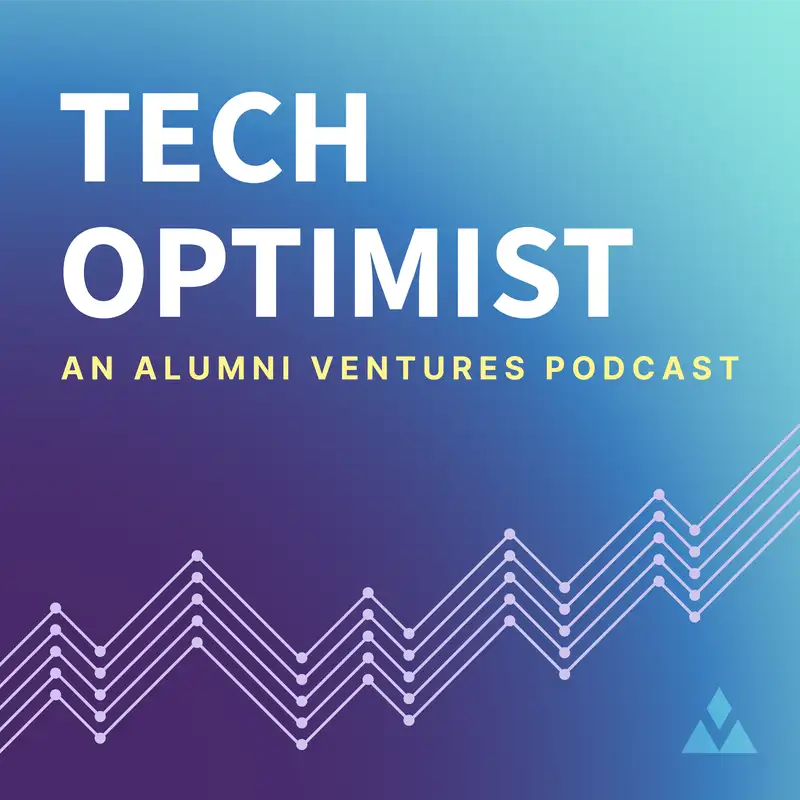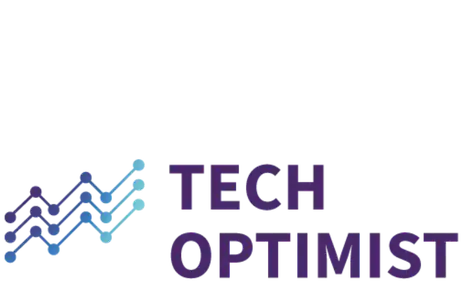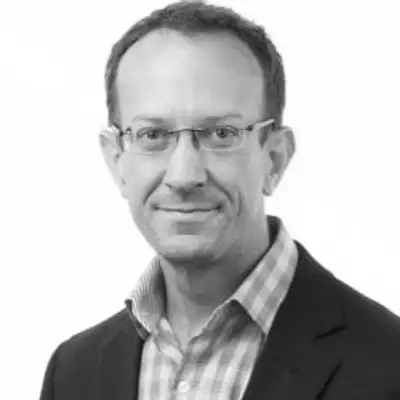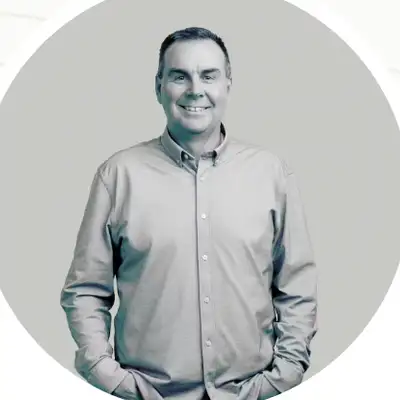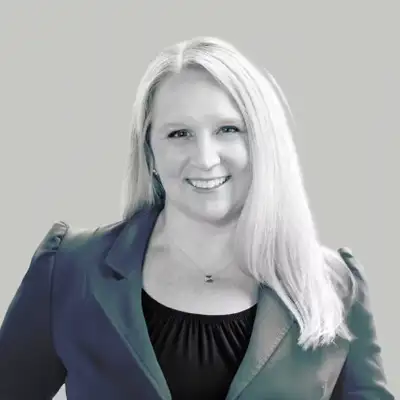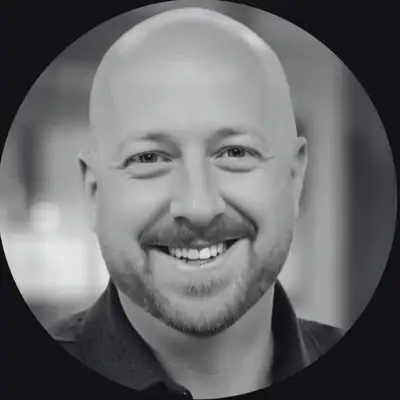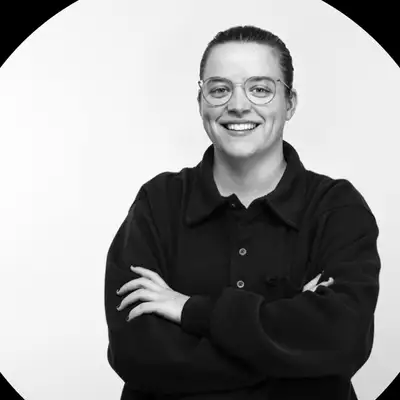#24 - This Startup Is Making Your Daily Products Safer
Sam:
You can use sugar to manufacture more sustainable products? All right, we got to hear this one. My name is Sam and this is the Tech Optimist. Welcome back.
Charlie Silver:
They're going out of business if we don't find ways to replace them, products are harmful to the people who consume them. So we are here really to carry the entire chemicals industry into the future.
Greg Baker:
You're making products better, not changing the price, taking petrochemicals out of the markets where they probably do not need to be.
Sam:
In a world captivated by criticism, it's easy to overlook the groundbreaking technologies shaping our future. Let's a light on innovators who are propelling us forward. As the most active venture capital firm in the US, we have an exceptional view of tech's real world impact. Join us as we explore, celebrate, and contribute to the stories of those creating tomorrow. Welcome to the Tech Optimist.
As a reminder, the Tech Optimist podcast is for the informational purposes only. It's not personalized advice and it's not an offer to buy or sell securities. For additional important details, please see the text description accompanying this episode.
Greg Baker:
Hello everyone and welcome to this edition of the Tech Optimist podcast. My name's Greg Baker, managing partner at Alumni Ventures. I'm joined today with Charlie Silver, co-founder and CEO of Ruby Bio. Welcome, Charlie.
Charlie Silver:
Thank you, Greg. It's nice to be here with you.
Greg Baker:
So hey, I'm a mechanical engineer by training. I didn't do it very often, but I'm very much an infrastructure guy and you've started Ruby Bio, why don't you tell people about how you're improving our dependence on petrochemicals.
Charlie Silver:
So the problem statement behind Ruby Bio is that petrochemicals have been with us for about 150 years now. They are one of the key infrastructure markets that serve the world. And from an economic perspective, they're going out of business if we don't find ways to replace them. And from a health perspective, both for people and for the health of the planet these chemicals, the way they are manufactured and the chemicals themselves are quite harmful to us and to the world that we live in.
Sam:
Hold on, let's take a quick pause here and I want to sort of help define and narrow down what petrochemicals are really quickly before we keep going. So petrochemicals are chemical substances derived from petroleum or crude oil or natural gas. They're crucial components of many industrial and consumer products, but they're classified into three main groups, olefins, aromatics and synthesis gas and inorganics. Some common examples are gasoline, kerosene. Some applications of petrochemicals and things that we use every single day so plastics, soaps and detergents, solvents, some drugs, fertilizers, pesticides, explosives. I hope you don't use explosives every day, but paint, epoxy resins, flooring, insulation, petrochemicals play a vital role in modern industry and are found in diverse products ranging from aspirin and luggage to automobiles, aircraft and polyester clothes. Okay, let's keep going. Thanks, Charlie.
Charlie Silver:
So Ruby Bio is building a brand new platform that takes chemicals from here into the next century on top of the very best sustainability and the very best manufacturing to produce the very best products that the world today demands with the economics and the sustainability that can take the world into the future. And if you think about it, these are some of the largest markets in the world. The specialty chemicals markets are about a trillion dollars and petrochemicals overall are pretty close to the same order of magnitude. These are some of the biggest industries out there. They've grown up over the last 150 years pretty opportunistically just one product at a time. And we've just gotten better and better as a world at converting petroleum into these end products that drive all of our lives each and every day. And the reality is petroleum is going to continue getting more and more expensive. These are very carbon-intensive products, so they put quite a bit of carbon into the atmosphere and the products are harmful to the people who consume them. So we are here really to carry the entire chemicals industry into the future.
Sam:
More on this and Ruby Bio right after this. Don't go anywhere.
Meera Oak:
Hey everyone. Just taking a quick break so I can tell you about the Seed Fund from Alumni Ventures. AV is one of the only VC firms focused on making venture capital accessible to individual investors like you. In fact, AV is one of the most active and best performing VCs in the US. And we co-invest alongside renowned lead investors. With our Seed Fund you'll have the opportunity to invest in a portfolio that aims to back some of the most innovative and scalable early-stage tech ventures all while focusing on the beginning of the venture funnel where valuations are typically most reasonable and the potential upside is greatest. To get started, visit us at av.bc/funds/seedfund.
Greg Baker:
Great. So specifically, how are you attacking that with your first product?
Charlie Silver:
So our approach is to bring sustainability as a feedstock and as a platform to the petrochemicals industry and replace these petrochemicals with alternative and really higher performing products. That's the way we think about shifting these markets over. What that means is that there are really two sides to this. One is the feedstock, meaning what are we feeding into the platform to convert? What resource do we feed the platform to convert it over into the products, which are the chemicals that we use? And then secondly, the process itself. How does the process do that conversion in a way that manufactures the best products with no harm to people and no harm to the planet? So tackling those one by one, we work with very different feedstocks. We are starting as a company in a market called surfactants. Now it's a big word, I always say it's a portmanteau, it's a mishmash of surface-active agent.
And this is a category of chemicals that catches a lot of different products, but they always have roughly the same function. It's a molecule that can dissolve in water on one side of the molecule and it can dissolve an oil on the other side of the molecule. And it's one molecule that serves that purpose. And because of what they do, they stabilize interfaces because if you can imagine if you have a formulation that's both oil and water, it holds it together. And where consumers tend to see these chemicals the most is where they're used as detergents. So you can imagine that the water-soluble side of the molecule plays with the oil-soluble side where the oil pulls the dirt off your clothes and then the water-soluble puts it into solution in the wash and then puts it down the drain. So because of that, these products are very, very widespread.
Whether we know it or not, we're all using them all the time. And our take on that is to bring different feedstocks to this market on the one hand. And what that means is within the surfactant space especially, this market started, again, about 150 years ago as an industrial market when we started pulling petroleum out of the ground and looking for better uses for it. And we turn them into chemistries that create these products and it's always oil that's been feeding these markets, meaning petroleum. Recently about 30 or 40 years ago, we think a lot about the economics driving these markets and coming out of the oil crisis in the '70s and all of the supply chain problems, the market tried shifting away from petroleum and over to tropical oils including palm oil, coconut, and other types of natural oils. Now it turns out recently the market has appreciated that those natural oils are just as unsustainable from an economic perspective as petroleum has ever been.
So the market's really trying to shift away and that's where we come in because we work with just a sugar feedstock. Sugar is natural, it's not a tropical product, which means it can grow anywhere in the world and above all it can also be derived from waste sources, from waste cooking oil or upcycled waste. However, even right now there's an enormous supply of sugar feeding the world. If you think about the ethanol and the bioethanol industry, that's all corn-derived feedstock and there's an enormous supply of that. One thing we're doing for the surfactant market is shifting away from petroleum and palm and other tropical oils and shifting to sugar, which is the most sustainable feedstock between corn derivative and upcycled waste. Now the other piece of it is we don't run chemistry to convert these products over the same way historically we've done with petrochemicals.
Instead of chemistry, our products are made almost exactly the same way we make beer, which is something we've been manufacturing for thousands of years as a species where beer is made using yeast. You put yeast in a fermenter, add some nutrients to it, and it spits out ethanol. It turns out you can engineer yeast. It's not the same species of yeast, but there are engineering methods that can turn that type of manufacturing into something that manufactures a whole range of chemicals. And that's exactly what's underneath our platform. So we use yeast, a very different type of yeast, but it's engineered to convert sugar or upcycled waste into these surfactants that all of us use every day. And that's really our push on the market. So rather than using these chemicals that are derived from petroleum that we pull out of the ground and ultimately put into your shampoo and your laundry detergent and your hand soap, there's a much more sustainable way of making them with the feedstock that will carry the world into the future.
Greg Baker:
Well, as we think about sustainability and the market adoption for it, there's one end of the curve that are willing to make major changes to their life and spend a lot of money to address the issue. But the bulk of civilization is not interesting, going back to the 1800s and trying to find a leaf to rub yourself in the river. And also it becomes challenging to get people to actually pay extra for what, quite frankly how much petroleum is being used to make the surfactant in my shampoo. So I think a lot of people would pass on having a huge impact on the price. So how do you address that? You're addressing the first part where we're not getting rid of shampoo or soap or detergent or things that use surfactants, but the price.
Charlie Silver:
What you're talking about here is the sheer incumbency of this industry. And what we really mean here is these are industries that really connect the entire world together in so many ways because the surfactant industry sells raw materials out to consumer packaged goods players such as Unilever, Procter & Gamble, and the big brands who then take that, formulate it, put it into a plastic bottle, which is another area for sustainability to correct, and then send it through distribution to the shelf where you pick it up as a consumer. And these industries are so tightly coupled because they grew up together over the last 150 years. It's very, very hard to disconnect them with a brand new infrastructure and a brand new product line.
So what you're talking about is the incumbency of this industry that's just interlocked with all of its end markets over the last 150 years and the gross margins in this space have had so much time to optimize. They've shaken every penny out of the supply chain to the point where if you try to give up a penny here or there, it pushes the whole thing out of business and it doesn't work. Our approach to that is a strategy which really hooks together our market strategy together with technology and market development and really everything we do as a company. And our strategy is to deliver just the very best performing products and in every category that we serve, this is a very important strategy statement for us as a company, we always want to be the best performing, if not much better performing than any other product in that category.
Whether it's petrochemicals or earlier bio-based chemicals or anything that our customers had to pick from. We always want to be the best performing. So that's number one, the reason customers buy products is because it performs, it does the job for you. The second part of it, Greg, obviously the cost is the other side of the equation and you can have the very best performance, but as we've just said, these supply chains are so interlocked if you change it by a few pennies, you're going to break the whole system. It's very important to have costs that match and that's why from the bottom up out of the gate, we've designed our technology to deliver unit economics that immediately match the market at the scale we're running.
And then we continue growing as the volumes build, the gross margins continue expanding, but we are always inserting products at the same economics that the market expects and that's really what wins deals for us. In the early days we walk in the door with the very best performing product and it's hard to say no to that, but okay, what's that going to cost? Well, it's cost competitive. You don't have to change your economics. And on top of that, it is the most sustainable platform with the most sustainable feedstock feeding it. So you have supply chain security and you know that the products you're selling down to your consumers are going to be beneficial to the consumer and to the planet. Once you've checked all of those boxes, it's hard for those incumbents to say no to it at that point. Once you've got the product, it matches what the market needs.
Sam:
I figured I would educate myself and dig into this a little bit. So I did my due diligence and my research on why sugar is the best feedstock, right? Just in general. And so sugar appears to be one of the best feedstocks for product manufacturing for these reasons. High efficiency, sugar crops like sugar beet and sugar cane have very high land efficiency producing more fermentable sugar per hectare than any other biomass source, which is pretty cool. It has low greenhouse gas emissions, obviously a huge plus. Sugar feedstocks, especially sugar cane, offers significant reductions in greenhouse gas emissions compared to the fossil based alternatives. Sugar cane is generally considered relatively sustainable due to its high energy balance and high GHG reduction potential. It's got a well-developed infrastructure. So the infrastructure and logistics for sugar production from crops like sugar beet and sugar cane are already well established, which makes sugar readily available as an industrial feedstock.
Versatility, fermentable sugars from crops can be used to produce a wide range of products including biofuels, biochemicals, and other materials. Exactly why Ruby Bio is using sugar as their feedstock. Cost-effectiveness, so the first generation sugar feedstocks often have lower GHG abatement costs compared to second generation alternatives, this makes them economically attractive for sustainable product manufacturing. Of course Ruby Bio's main goal here in their company. And availability, this is the big one. So with changes in sugar quotas and decreasing demand from the food industry in some regions there is increasing availability of sugar for industrial applications. Their overall efficiency and sustainability profile makes them one of the best options for many product manufacturing processes, especially in the bio-waste chemical industry. All right, let's keep going.
Greg Baker:
So where are you in this journey?
Charlie Silver:
When we started the company, my co-founder and I have built other businesses, we're fairly experienced at scoping out a market and lifting up a business to scale using these fairly heavily engineered biotechnology platforms. We've done this before. So when we looked at this market, we pieced together the very best platform that is purpose-built to serve exactly this market. And this market has had a very minimal innovation, I would say, in recent decades as they've really squeezed all the cost out of the products. So we were able to come in with just a brand new approach to getting there and with everything open to us in terms of which technology to pick, we picked a technology strategically that's able to scale up very quickly with unit economics that work out of the gate with products that we were able to manufacture from day one.
So we've been sampling product from the very first day we started the company, we've been able to send samples out to customers. We've had a lot of customers testing our product in their applications into their market over the last year, year and a half or so. And at our stage, the most important thing is to go wide because this is a large market with lots of end user applications, we will serve all of it over time because these products are important to flip over. What that means is, again, from day one, we've been sampling, we have a lot of applications that we've demonstrated with customers ranging from detergents to hand soap to shampoo to industrial applications such as lubricants. Through to even food applications such as food emulsifiers. So we've tested lots of these applications with customers and we are just now starting to close our first really large deals with some big customers who are interested in moving their supply chains away from both petroleum and tropical oils and moving their ingredient supply into the future.
Greg Baker:
Well, great. So you're making products better, not changing the price and taking petrochemicals out of the markets where they probably do not need to be. Shouldn't be an easy sale. It's probably why we invested. In your background, you're in a small group of people, we've invested in you twice at Alumni Ventures, so you gave a little bit of your background, but let's hear a little more and where you're going long-term with this.
Charlie Silver:
Yeah, so I am a product builder and a market builder and a company builder. I'm someone who just does whatever it takes to get business lifted up from scratch. And I've done this before, so rewinding to where I began. I am from Denver initially, I grew up as the youngest of six kids and my father was a PhD in operations research and mathematics. He built his career during the heyday of the aerospace industry in the '60s and '70s in the days of big engineering. And I think I acquired from him a certain curiosity about the world in terms of how it works and where we've come from and above all how we can improve it. I think I certainly learned that from him from an early age. I studied astrophysics in college and I also studied philosophy actually side by side and both of those are disciplines that teach you to ask questions and then answer them based on observing the world around us.
I also studied physics in graduate school, so I took a master's from the University of Wisconsin and I'm really a lifelong student ever since then. I am very curious about everything about the world around me and since then my combination of physics background and MBA I think has helped me really create technologies and businesses in a few areas. So I've always played in what we now call deep tech, which I think is something that a physics background trains you in. Back then we just called it technology, but we just thought we were building new technology. But these days we tend to call that deep tech and I've always been around very heavily engineered products that roll together multiple disciplines into the very best product that can serve market. I started in telecom back in the early 2000s, I've been in semiconductors. This was a company called Novillex, which was acquired by Agilent a little over a decade ago so I spent a couple of years also in global business development after we finished the integration with Agilent. And then the last decade or so I've spent in biotechnology.
So the last company that I partnered with Alumni Ventures around was Mission Bio, which is a company that I spun out of UC San Francisco, together with a technical founding team. Got the company off the ground as a spin-out I'd grown from scratch through to full global scale, which is a company that is now making an enormous impact in the cancer and cell and gene therapy space. It's a brand new cancer genomics platform that identifies the very best biomarkers to tease out disease progression but also pick the right drugs for the right patient at the right point in treatment. And very proud of what I built at that company. Biotechnology really grew up over the last couple of decades through the drug development industry and the work that Mission Bio did supporting the drug industry is one of the most innovative biotech platforms out there in life sciences. And it turns out that same biotech toolkit can be re-engineered to manufacture chemicals at full scale. So it's similar technologies that we work with at Ruby Bio to serve very different markets.
Greg Baker:
Great. Let's take a break right here and we'll be back with a little more with Charlie Silver.
Sam:
We'll be right back.
Speaker 5:
Ever wonder how the ultra wealthy invest their money? They often back startups before they go public through venture capital. Now individual investors like you can too with Alumni Ventures. Visit av.vc to get started.
Greg Baker:
All right, well we're back. Charlie, let's talk a little bit about where you're going after surfactants and emulsifiers, big words for small things. What would be next in the progression for Ruby?
Charlie Silver:
So when we started this company really just a couple of years ago, we started with nothing more than the premise that petrochemicals need replacing, and that was the first mission of the company. And then we looked for the right market to stand up on where we could start a business and then keep moving from there, that led us to surfactants. And really our long-term picture for this company is to build the next large chemical supplier that takes the world into the future. We think of the giants that serve the industry today, the Dows and BASFs and Evoniks of the world. We think of these as the feedstock of the 19th century, which is petroleum together with the chemistry of the 20th century. And that's everything that synthetic chemistry gave us, but they really don't have legs into the future, and we really think of Ruby Bio's approach as a way of carrying that market that they created over the last 150 years into the future that the world needs.
So we really are building this to be the large scale chemicals provider that will serve this century and carry us into the next century. Of course, you take larger bites along the way, you take smaller bites along the way. So initially we've been quite narrowly focused in the consumer care side of the surfactant market. So we sell products that are very commonly used in, for instance, hand soaps and shampoos. One of the most important products we've got out right now is used for putting fragrances into formulations and it turns out that the old fragrance solubilizing surfactants are quite harmful chemistries that have just never been overhauled for the future. So that's our first product and before long you'll find our ingredients in pretty much anything that's got a fragrance that you buy off the shelf. The next markets we're heading into are large scale surfactants. So these are the detergents that serve your laundry and your dish soap and industrial cleaning applications.
We also have exciting applications in the food space. It turns out food emulsifiers are not as natural as we might think, even though we think of them as food ingredients, especially the ones that come with a lot of the processed foods that feed the world. And we have just a much more natural, cleaner, friendlier and sustainable emulsifier with better performance at equivalent costs. So that's another market we're heading into. And from there we build it market by market, from food emulsifiers we will continue pushing into industrial markets where we've already started playing with some customers. And then as we get past mainstream surfactants, there are a lot of other specialty chemicals that we built a platform to continue extending into.
Greg Baker:
Well, so you're going to replace petrochemicals in the chemical industry. You helped with a company that's addressing major issues in cancer and health. What can you ask of us? What can Alumni Ventures and our huge network do for you?
Charlie Silver:
Well, above all at this stage, we are looking for connections and network and any touch points that build us in with the large consumer packaged goods players and also those types of partners in the industry. It turns out this is a very large market. It turns out the entire market, wherever you go, is generally driven by these, I think of these tailwinds of the shift over from petroleum and palm to better feedstocks as well as chemistries that steer away from regulatory and move the world to a safer place. And it's really a matter of finding the customers that are just ready to flip over very quickly because there are customers everywhere who see the value. It's a question of which ones are able to move the fastest, and that's where we really appreciate our network.
Greg Baker:
Not a real heavy ask to go to consumer product goods companies and say... You can make an introduction to someone who can make their product better, no added cost and more sustainable for the environment. That's a no-brainer for most companies, I would think.
Charlie Silver:
When you've got better performance at an equivalent cost and you can shout out about that performance on the label that consumers see, this is what we're seeing from our customers, there's really no reason you wouldn't switch.
Greg Baker:
All right. Well, thank you very much for your time. I want you to get back to work and solve these problems for us. And thanks again for your time and everyone, thank you for joining this edition of the Tech Optimist podcast and we appreciate it. Thanks.
Sam:
Thanks again for tuning into the Tech Optimist. If you enjoyed this episode, we'd really appreciate it if you'd give us a rating on whichever podcast app you're using and remember to subscribe to keep up with each episode. The Tech Optimist welcomes any questions, comments, or segment suggestions. So please email us at info@techoptimist.vc with any of those and be sure to visit our website at av.vc. As always, keep building.
